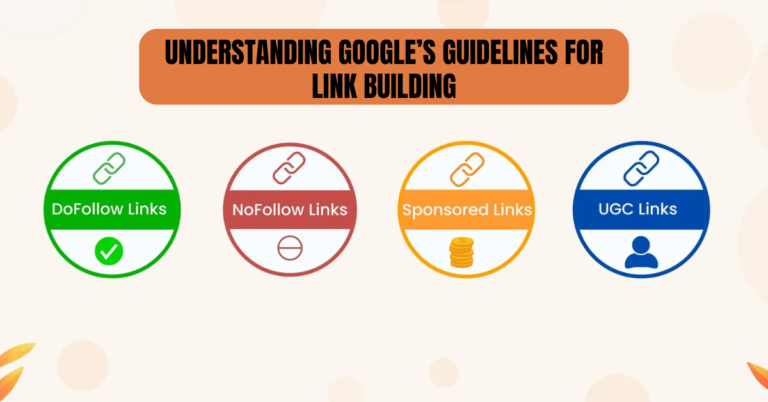Samsung Galaxy M05 (Mint Green, 4GB RAM, 64 GB Storage) | 50MP Dual Camera | Bigger 6.7" HD+ Display | 5000mAh Battery | 25W Fast Charging | 2 Gen OS Upgrade & 4 Year Security Update | Without Charger
₹6,498.00 (as of April 2, 2025 21:16 GMT +05:30 - More infoProduct prices and availability are accurate as of the date/time indicated and are subject to change. Any price and availability information displayed on [relevant Amazon Site(s), as applicable] at the time of purchase will apply to the purchase of this product.)Link building is a critical aspect of SEO that significantly impacts a website’s ranking on search engine results pages (SERPs). However, effective link building requires adhering to Google’s guidelines, which aim to maintain the quality and integrity of search results. By understanding and following these guidelines, businesses can build a solid backlink profile that helps improve visibility and authority without risking penalties.
In this article, we’ll explore Google’s guidelines for link building, the best practices to follow, and the types of strategies that provide lasting value for websites.
Why Link Building Matters
Google considers links as “votes of confidence” for websites. When reputable sites link to your pages, they signal to Google that your content is valuable and trustworthy. However, not all links are created equal. High-quality, relevant links help elevate your site's ranking, while low-quality or manipulative links can lead to penalties.
To avoid these pitfalls and leverage link building effectively, many businesses turn to professional link building services Melbourne that understand Google’s requirements and can develop strategies that align with your brand’s goals.
Google’s General Guidelines for Link Building
Google’s link-building guidelines emphasize natural, high-quality links that are acquired through genuine relationships, valuable content, and relevance. These guidelines aim to ensure that links are earned rather than manipulated. Here are some foundational principles Google advises for link building:
-Avoid Link Schemes: Google’s algorithms can detect link schemes, or strategies designed to manipulate rankings by obtaining numerous low-quality links. This includes paid links, excessive link exchanges, or links from irrelevant sources.
-Focus on Relevance: Links should come from websites relevant to your industry, topic, or location. For example, if you run a fitness blog, links from health, wellness, or sports-related sites are more valuable than random, unrelated sources.
-Prioritize Quality Over Quantity: Google values quality links over sheer quantity. A handful of authoritative, contextually relevant links are worth more than dozens of low-quality links.
-Use Natural Anchor Text: Anchor text is the clickable text of a link. Google’s guidelines suggest using natural, descriptive language in anchor text rather than stuffing it with exact-match keywords, as this appears more natural and credible.
Best Practices for Link Building According to Google
Google recommends several best practices to ensure your link-building efforts are effective and compliant with its guidelines. Following these practices can help you develop a strong, sustainable backlink profile that positively impacts your site’s SEO.
-Create High-Quality Content: Quality content is the foundation of successful link building services Sydney. When you produce valuable, informative, or engaging content, other websites are more likely to link to it naturally. Original research, how-to guides, infographics, and comprehensive industry reports are some examples of content that tend to attract organic backlinks.
-Engage in Content Marketing and Outreach: Once you have quality content, reach out to industry-relevant sites, blogs, and publications to share it. You can collaborate on guest posts, offer to be a source for quotes, or contribute expert insights. Effective outreach helps build relationships that can lead to valuable, relevant links.
-Leverage User-Generated Content: Allowing users to contribute reviews, testimonials, or guest content can help generate organic links. User-generated content is trusted by audiences and, when managed responsibly, can also improve SEO by increasing engagement.
-Utilize Linkable Assets: Develop linkable assets, such as case studies, original data, whitepapers, and visuals like infographics, which are likely to be shared and linked to by others. These resources offer unique insights or value that make them attractive for others to reference.
Types of Links to Avoid
Google’s guidelines highlight several types of links to avoid due to their potential to manipulate rankings. Engaging in these practices may lead to penalties, undoing your SEO progress. Some links to avoid include:
-Paid Links: Buying or selling links that pass PageRank is against Google’s guidelines unless they are marked with a “nofollow” or “sponsored” attribute. This attribute tells Google that the link is paid for and should not impact search rankings.
-Excessive Guest Posting for Links: Guest posting can be valuable for outreach and exposure, but excessive guest posts purely for link building is discouraged. Google can recognize patterns of manipulation, especially if the posts are low quality or irrelevant.
-Irrelevant and Low-Quality Directory Links: Listing your site in numerous low-quality directories or unrelated industry directories can harm SEO. Instead, focus on relevant, reputable directories or industry-specific directories.
-Automated Link Generation: Any form of automated link generation (using bots or software) is viewed as spam by Google. Manual, organic link building may take longer, but it is much safer and more effective in the long run.
Nurturing Relationships for Long-Term Link Building Success
Building a network within your industry and community can help you gain long-term link-building benefits. Engaging in partnerships, co-marketing opportunities, and cross-promotional activities can naturally increase your link profile. Being active in relevant forums, online communities, and social media also helps you build connections with those who may eventually link to your content.
Link-building services from an experienced SEO team can often help manage these relationships and ensure that your efforts comply with Google’s guidelines. These services also help monitor your link profile, making it easier to adjust strategies as Google’s algorithms evolve.
Tracking and Adjusting Your Link-Building Strategy
Link building is not a one-and-done process. Google encourages businesses to continually monitor and adjust their link-building strategies to maintain high-quality standards. Here’s how to ensure your strategy stays effective:
-Use Analytics to Track Performance: Regularly check your analytics to monitor where your links are coming from, which pages are attracting the most links, and how this affects your overall SEO. This helps you understand the impact of each link-building effort.
-Disavow Harmful Links: If your site has acquired harmful or irrelevant backlinks, consider using Google’s Disavow Tool. This tool allows you to “disavow” links that may be harming your SEO, signaling to Google to ignore them.
-Stay Updated on Google’s Guidelines: Google updates its guidelines and algorithms frequently. Staying informed and adjusting your link-building practices accordingly will ensure that your SEO strategy remains compliant and effective.
Link building is a powerful way to enhance your website’s SEO and increase its authority in search engines. However, following Google’s guidelines for link building is essential to avoid penalties and build a sustainable, effective backlink profile. By focusing on quality content, building relevant relationships, and monitoring your link profile, you can create a link-building strategy that aligns with Google’s best practices.
Incorporating reputable link-building services can also support your efforts, ensuring that your link-building tactics are both impactful and in line with current SEO standards. By adhering to these guidelines, you’ll strengthen your brand’s online presence, enhance credibility, and achieve long-term success in the competitive digital landscape.







0 Comments